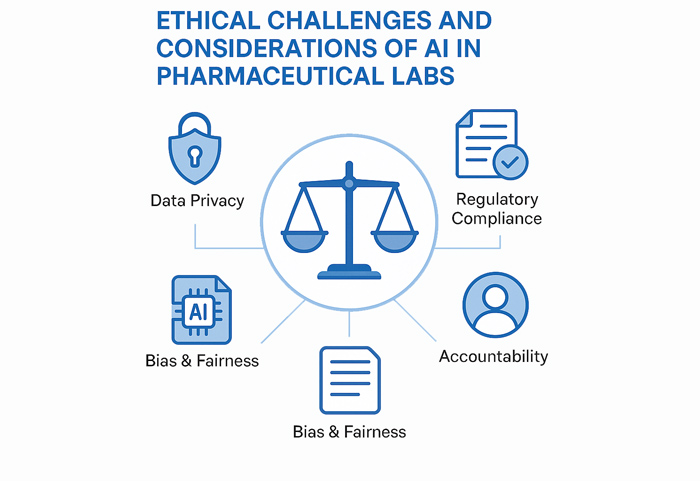Challenges and Ethical Considerations of Generative AI in Pharma Labs
The integration of generative artificial intelligence into pharmaceutical laboratories presents unprecedented opportunities for accelerating drug discovery and improving research efficiency. However, this technological transformation also introduces complex ethical challenges and practical considerations that require careful analysis and proactive management. As pharmaceutical organizations increasingly rely on AI-generated insights to guide critical decisions affecting human health, the industry must grapple with fundamental questions about responsibility, transparency, bias, privacy, and the appropriate balance between technological capability and human oversight in life-sciences research.
The Ethical Landscape of AI in Pharmaceutical Research
The deployment of generative AI in pharmaceutical laboratories operates within a unique ethical context where technological decisions can have profound implications for patient safety, therapeutic access, and public health outcomes. Unlike many commercial AI applications, pharmaceutical research AI systems influence the development of treatments that may be used by millions of patients, making ethical considerations particularly consequential and demanding heightened scrutiny.
Traditional pharmaceutical research ethics frameworks, developed for human-driven research processes, must be adapted to address the unique challenges posed by AI systems that can generate novel hypotheses, design experiments, and analyze results with minimal human intervention. These adaptations require careful consideration of how established ethical principles including beneficence, non-maleficence, autonomy, and justice apply to AI-mediated research activities.
The complexity of modern AI systems creates additional ethical challenges related to transparency, explainability, and accountability. When AI algorithms make recommendations that influence therapeutic development decisions, stakeholders including researchers, regulators, and ultimately patients have legitimate interests in understanding how these recommendations were generated and whether they can be trusted to serve human interests effectively.
Ethical Challenges of Generative AI in Pharma Labs encompass a broad range of issues that extend beyond traditional research ethics to include questions about algorithmic fairness, data governance, intellectual property rights, and the appropriate distribution of benefits and risks associated with AI-enhanced pharmaceutical research.

Bias and Discrimination in AI-Generated Research Insights
One of the most significant ethical challenges facing AI-enhanced pharmaceutical research involves the potential for algorithmic bias to influence research directions, target selection, and therapeutic development priorities in ways that could exacerbate existing healthcare disparities. AI systems trained on historical research data may perpetuate systematic biases that have historically disadvantaged certain patient populations or therapeutic areas.
Demographic bias in training datasets represents a particularly concerning issue, as pharmaceutical research has historically been conducted primarily in populations from developed countries with specific genetic backgrounds. AI systems trained on these datasets may generate recommendations that are less applicable to diverse global populations, potentially perpetuating therapeutic inequities that limit access to effective treatments for underrepresented groups.
Disease prioritization bias emerges when AI systems preferentially recommend research directions focused on diseases affecting profitable market segments while de-emphasizing rare diseases or conditions primarily affecting economically disadvantaged populations. This algorithmic bias could systematically redirect research resources away from areas of significant unmet medical need toward more commercially attractive opportunities.
Target selection bias may occur when AI systems exhibit preferences for certain types of biological targets or therapeutic modalities based on historical success patterns that may not reflect current technological capabilities or patient needs. This bias could limit therapeutic innovation by discouraging exploration of novel approaches that might offer superior patient outcomes.
The complexity of biological systems and the limitations of current scientific understanding create additional opportunities for AI systems to develop biased interpretations of research data that could mislead therapeutic development efforts. Addressing these bias challenges requires comprehensive audit processes, diverse training datasets, and ongoing monitoring to ensure that AI recommendations serve broad therapeutic objectives rather than narrow commercial interests.
Transparency and Explainability in AI Decision-Making
The black-box nature of many sophisticated AI systems creates significant transparency challenges for pharmaceutical research applications where understanding the rationale behind AI recommendations is essential for scientific validation, regulatory compliance, and ethical oversight. When AI systems generate novel therapeutic targets, experimental designs, or safety predictions, stakeholders need clear explanations of how these recommendations were derived and what evidence supports their validity.
Algorithmic transparency becomes particularly critical when AI recommendations conflict with established scientific understanding or challenge conventional research approaches. Researchers must be able to evaluate the reasoning behind AI suggestions to determine whether they represent genuine scientific insights or reflect limitations in training data or algorithmic design.
Regulatory transparency requirements demand comprehensive documentation of AI decision-making processes to support regulatory review and approval processes. Pharmaceutical companies must be able to explain how AI systems contributed to therapeutic development decisions and demonstrate that these systems meet appropriate standards for scientific validity and patient safety.
Patient and public transparency interests extend beyond regulatory requirements to encompass broader questions about how AI-generated insights influence therapeutic development and healthcare delivery. Patients and advocacy groups have legitimate interests in understanding how AI systems might affect the availability and characteristics of future treatments.
The technical complexity of modern AI systems creates communication challenges when attempting to explain algorithmic reasoning to stakeholders with diverse technical backgrounds. Effective transparency approaches must balance technical accuracy with accessibility while ensuring that essential information is not lost in translation between technical and non-technical audiences.
Data Privacy and Confidentiality Concerns
Pharmaceutical AI systems typically require access to extensive datasets that may include sensitive information about patients, proprietary research results, competitive intelligence, and confidential business strategies. Managing these diverse privacy and confidentiality requirements while enabling effective AI training and deployment presents complex ethical and practical challenges.
Patient data privacy represents a fundamental concern when AI systems analyze clinical trial data, electronic health records, or biobank samples that contain personally identifiable health information. Even when data is nominally de-identified, sophisticated AI systems may be able to re-identify individuals through pattern recognition capabilities that exceed traditional privacy protection approaches.
Competitive confidentiality challenges arise when pharmaceutical companies collaborate on AI development initiatives or share data to improve algorithmic performance. These collaborative approaches offer significant benefits for advancing AI capabilities but require careful management to protect proprietary information while enabling beneficial knowledge sharing.
Cross-border data transfer requirements complicate privacy management when AI systems operate across multiple jurisdictions with different privacy regulations and cultural expectations. Pharmaceutical companies must ensure compliance with diverse regulatory frameworks while maintaining effective AI functionality across global research operations.
The potential for AI systems to generate insights that inadvertently reveal confidential information presents additional privacy challenges. For example, AI analysis of published research results might reveal proprietary experimental approaches or identify competitive vulnerabilities that were not intended for public disclosure.
Intellectual Property and Innovation Ethics
The use of generative AI in pharmaceutical research creates novel questions about intellectual property ownership, innovation attribution, and fair compensation for AI-generated discoveries. Traditional intellectual property frameworks assume human inventorship and may not adequately address situations where AI systems make significant contributions to therapeutic discoveries.
AI-generated invention questions challenge conventional notions of inventorship when AI systems propose novel therapeutic targets, design innovative molecular structures, or identify unexpected applications for existing compounds. Legal and ethical frameworks must evolve to address whether AI systems can be considered inventors and how credit should be attributed for AI-generated discoveries.
Training data ownership issues arise when AI systems are trained on proprietary datasets from multiple organizations or incorporate insights from published research results. Questions about compensation and attribution become complex when AI-generated recommendations build upon diverse intellectual property contributions that may be difficult to identify and quantify.
Open science principles may conflict with commercial interests when pharmaceutical companies develop proprietary AI systems using publicly funded research data or academic collaborations. Balancing the benefits of open scientific collaboration with legitimate commercial interests requires careful consideration of intellectual property arrangements and benefit-sharing approaches.
The potential for AI systems to facilitate innovation while simultaneously creating market concentration raises questions about whether AI-enhanced pharmaceutical research will democratize innovation or create advantages primarily for organizations with access to advanced AI capabilities and extensive datasets.
Responsibility and Accountability in AI-Mediated Research
Establishing appropriate responsibility and accountability frameworks for AI-enhanced pharmaceutical research presents complex challenges when AI systems make recommendations that influence critical decisions affecting patient safety and therapeutic effectiveness. Traditional accountability structures assume human decision-makers who can be held responsible for research outcomes, but AI systems introduce intermediate layers that complicate responsibility attribution.
Research responsibility questions arise when AI systems contribute to experimental design decisions, data analysis approaches, or therapeutic development strategies that ultimately influence patient outcomes. Determining appropriate levels of human oversight and intervention requires careful balance between leveraging AI capabilities and maintaining human accountability for research decisions.
Liability considerations become complex when AI recommendations contribute to therapeutic failures, safety issues, or research misconduct. Legal and regulatory frameworks must address how responsibility should be allocated between AI developers, pharmaceutical companies, and individual researchers when AI systems contribute to adverse outcomes.
Professional ethics requirements for researchers using AI systems need clarification regarding appropriate levels of AI reliance, validation requirements, and disclosure obligations. Professional societies and regulatory bodies must develop guidance that helps researchers navigate ethical challenges while effectively utilizing AI capabilities.
The temporal dimensions of accountability present additional challenges when AI systems learn and evolve over time, potentially changing their recommendation patterns in ways that were not anticipated during initial deployment. Ongoing monitoring and accountability mechanisms must address how responsibility is maintained as AI systems adapt and potentially deviate from their original training objectives.
Regulatory and Compliance Considerations
The integration of AI into pharmaceutical research creates new regulatory challenges that existing frameworks may not adequately address. Regulatory agencies must develop approaches for evaluating AI-enhanced research methodologies while ensuring that traditional safety and efficacy standards are maintained or appropriately adapted.
Validation requirements for AI systems used in pharmaceutical research must establish appropriate standards for algorithmic performance, reliability, and safety without unnecessarily impeding beneficial innovation. These standards must account for the probabilistic nature of AI recommendations while ensuring adequate confidence for therapeutic development decisions.
Quality assurance frameworks must address how AI systems should be monitored, validated, and updated throughout their operational lifecycles. Traditional quality assurance approaches developed for human-driven processes may not be adequate for AI systems that can change their behavior through learning or updates.
International harmonization becomes increasingly important as pharmaceutical companies deploy AI systems across multiple jurisdictions with different regulatory expectations and cultural values. Developing globally consistent approaches to AI regulation while respecting local values and priorities presents significant coordination challenges.
The pace of AI technological development creates ongoing challenges for regulatory frameworks that typically require extended periods for development and implementation. Regulatory agencies must balance the need for thorough evaluation with the importance of maintaining current relevance as AI capabilities continue to evolve rapidly.
Addressing Ethical Challenges Through Governance Frameworks
Developing comprehensive governance frameworks that address Ethical Challenges of Generative AI in Pharma Labs requires multi-stakeholder collaboration involving pharmaceutical companies, regulatory agencies, academic institutions, patient advocacy groups, and ethics experts. These governance frameworks must be sufficiently robust to address current ethical challenges while remaining adaptable to evolving technological capabilities and societal expectations.
Ethics committees specialized in AI applications can provide ongoing oversight and guidance for pharmaceutical research programs that incorporate AI systems. These committees should include diverse expertise encompassing technical AI knowledge, pharmaceutical research experience, regulatory understanding, and ethical analysis capabilities.
Audit and monitoring systems should be implemented to ensure ongoing compliance with ethical standards and to identify emerging ethical issues that may require attention. These systems should incorporate both technical performance monitoring and broader assessment of ethical implications and societal impacts.
Stakeholder engagement processes should ensure that diverse perspectives are incorporated into AI governance decisions, including input from patients, healthcare providers, researchers, and public interest groups. These engagement processes should be designed to facilitate meaningful participation while avoiding tokenism or inadequate representation of affected communities.
Training and education programs should ensure that researchers, managers, and other stakeholders understand the ethical implications of AI use in pharmaceutical research and are equipped to identify and address ethical challenges as they arise. These programs should be regularly updated to address evolving ethical considerations and technological capabilities.
Future Directions and Emerging Considerations
The ethical landscape surrounding AI in pharmaceutical research will continue to evolve as technological capabilities advance and societal understanding of AI implications deepens. Emerging considerations including quantum computing applications, advanced robotics integration, and autonomous research systems will introduce new ethical challenges that current frameworks may not adequately address.
Global collaboration initiatives may be needed to address ethical challenges that transcend national boundaries and require coordinated international responses. These initiatives could include development of shared ethical standards, collaborative monitoring systems, and coordinated approaches to emerging ethical challenges.
Adaptive governance approaches that can respond quickly to emerging ethical issues while maintaining stability and predictability for research planning will become increasingly important as AI capabilities continue to evolve. These approaches must balance flexibility with consistency while ensuring adequate protection for patient and public interests.
Public engagement and democratic participation in AI governance decisions may become increasingly important as AI systems play larger roles in determining therapeutic development priorities and research directions that affect broad populations. Developing effective mechanisms for public participation while maintaining scientific rigor presents ongoing challenges.
Conclusion
The integration of generative AI into pharmaceutical laboratories presents both unprecedented opportunities and significant ethical challenges that require careful analysis and proactive management. Ethical Challenges of Generative AI in Pharma Labs encompass issues ranging from algorithmic bias and transparency to privacy protection and responsibility attribution that must be systematically addressed to ensure that AI technologies serve human interests effectively.
Successfully addressing these ethical challenges requires comprehensive governance frameworks, multi-stakeholder collaboration, and ongoing commitment to ethical principles that prioritize patient safety, scientific integrity, and social justice. Pharmaceutical organizations that proactively address these ethical considerations will be better positioned to realize the benefits of AI technologies while maintaining public trust and regulatory compliance.
The future of AI in pharmaceutical research depends not only on technological advancement but also on the industry’s ability to develop and implement ethical frameworks that ensure AI systems contribute to human flourishing while respecting fundamental values and rights. This ethical foundation is essential for maintaining public support and regulatory approval for AI-enhanced pharmaceutical research that promises to accelerate the development of life-saving therapeutics.























